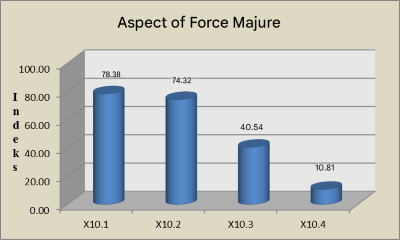Critical Factors in Determining the Success of Government Self-Management Projects: A Case Study Irrigation Water Use Acceleration Program/P3-TGAI
DOI:
https://doi.org/10.24036/cived.v12i1.569Keywords:
Critical Factors, Self-managed Projects, Case Studies, Acceleration ProgramsAbstract
This research is motivated by the importance of predicting the implementation of a project in the construction field to achieve a success where a project is said to be successful if the project can be completed at a competitive cost, can be completed on time or even faster than the scheduled time, and the quality is achieved. The aim of this study is to determine the critical success factor of government self-management projects (Acceleration Program for Irrigation Water Use Improvement/P3TGAI), so that undesirable things such as cost swells, time delays and others can be predicted as early as possible. This research uses a descriptive method where the populations are community assistance staff (TPM) and Center Management Consultants (KMB) in the program of Acceleration Program for Irrigation Water Use Improvement (P3-TGAI) in the Sumatra V River Basin Center and questionnaires are used as data collection techniques. The results showed that there are 5 determinants of the success of the self-management project for P3-TGAI, such as good communication between parties involved in the project (95.95); appropriate/appropriate work planning (91.89); monitoring of the project by the parties involved (89.19); ability to solve project problems by the parties involved (83.78); proper cost management by the parties involved (83.78). Then, there are 10 aspects that determine the success of P3-TGAI self-management projects, these factors are formed from the highest index in each aspect surveyed.
Downloads
References
E. Bambang, "Determining Factors For The Success Of Design And Build Projects.," Journal Of Civil Engineering And Planning 1, p. 10, 2018.
P. Decree, Transparency of State Revenue. Article. No. 54 Article 26., 2010.
P. Decree, Procurement of Goods/Services. No. 7 Article 26., 2012.
P. e. a. Dwi, Community Empowerment in the Field of Economic Enterprises (Study on community empowerment in Mojokerto City). 1 (4)., 2020.
M. EL-Reedy, Offshore Structure Design,, Oxford: Elsever.: Construction and Maintenance. , 2012.
Guidelines, Implementation Guidelines for the Acceleration Program for Improving Irrigation Water Utilization (P3-TGAI)., Padang: OPSDA S V. Sumatra River Basin Center V, 2020.
O. Hartanti, "Evaluation study of the implementation of K3 policies on falling accidents in building construction projects,," Thesis, FT UI, Salemba., 2012.
A. Hearsa, "Identification of Factors Determining Contractor Profits in Construction Project Implementation, Final Project," FTUNAND, 2013.
A. Husen, Project Management., Yogyakarta: Andi, 2019.
T. Instructions, Techincal Instructions for The Irrigation Water Utilization Acceleration Program (P3-TGAI), Directorate of Operations and Maintenance, 2019.
H. Irdayani, Constraints on Self-Managed Construction Projects in Pinrang Regency. Vol 8. No 1, 2016.
M. e. a. Natalia, "Analysis of Critical Success Factors of Construction Projects In Padang City," vol. Vol. 6 No. 2, 2017.
T. Nugroho, "Paradigms, Models, Development Approaches, and Community Empowerment in the Regional Autonomy Era.," Malang, FIA. Brawijaya University., 2007.
e. a. Tarigan MA, "Design and build risk factors that affect the success of the total rehabilitation project of educational buildings in the province of the Special Capital Region of Jakarta.," Journal of Civil Engineering and Planning Archives (JARSP), 2018.
A. Tudi, Implementation Of Community-Based Environmental Sanitation (BSLBM) Sustainable Development Policy In Tebo Regency, Padang: UNAND, 2018.

Downloads
Published
How to Cite
Issue
Section
License
Copyright (c) 2025 Vero Gusri Vernando, Taufika Ophiyandri, Benny Hidayat, Micky Fetriani

This work is licensed under a Creative Commons Attribution 4.0 International License.







2.jpg)
